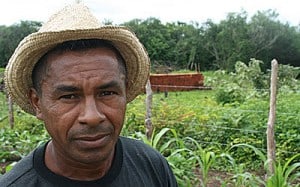January 11 was National Human Trafficking Awareness Day. Like the toil and tragedy of the life of the enslaved, this day came and went without much publicity or awareness on the part of the general public. Faithworks – courtesy of Catholic Relief Services – has a story worth reading that helps us understand the issues surrounding human trafficking and to help bring these to light. We learn some harsh facts about not only those who suffer harshly, but also the ways we are connected to this system of labor.
Sadly, we learn that we are consumers of slave labor. Charcoal and sugarcane are two Brazilian exports that depend on slave labor. These happen to be key ingredients for aspects of American industry: charcoal for steel production, and sugarcane for the production of more efficient biofuels. Consumption leads to increased demand, which will inevitably increase production to supply consumers with their product (at least that’s what I think I learned in sophomore year macro-economics). To supply us consumers, producers need more labor, and this means more are brought (and often tricked) into slave labor.
We learn that slaves can escape their predicament – but only through the collaboration of civic governments, the church, and private charity. Faithworks has profiled recently freed slaves as well as those who work on their behalf. Former slaves like Antonio Jose de Santos Filho have received back pay from the Brazilian government and can take part in Nova Conquista – a self-sustaining community that is run in conjunction with the Pastoral Land Commission. Nova Conquista comprises 2670 acres of land and 30 houses in the northern Brazilian state of Paiuí. Nova Conquista demonstrates to all what could be when states, churches, and activists collaborate for the sake of the oppressed.
We learn that the Exodus did not only occur in Egypt three thousand years ago, but rather continues to this very day. If you wish to aid this exodus and the world’s (at least) 12 million trafficked persons, check out Catholic Relief Services today.
